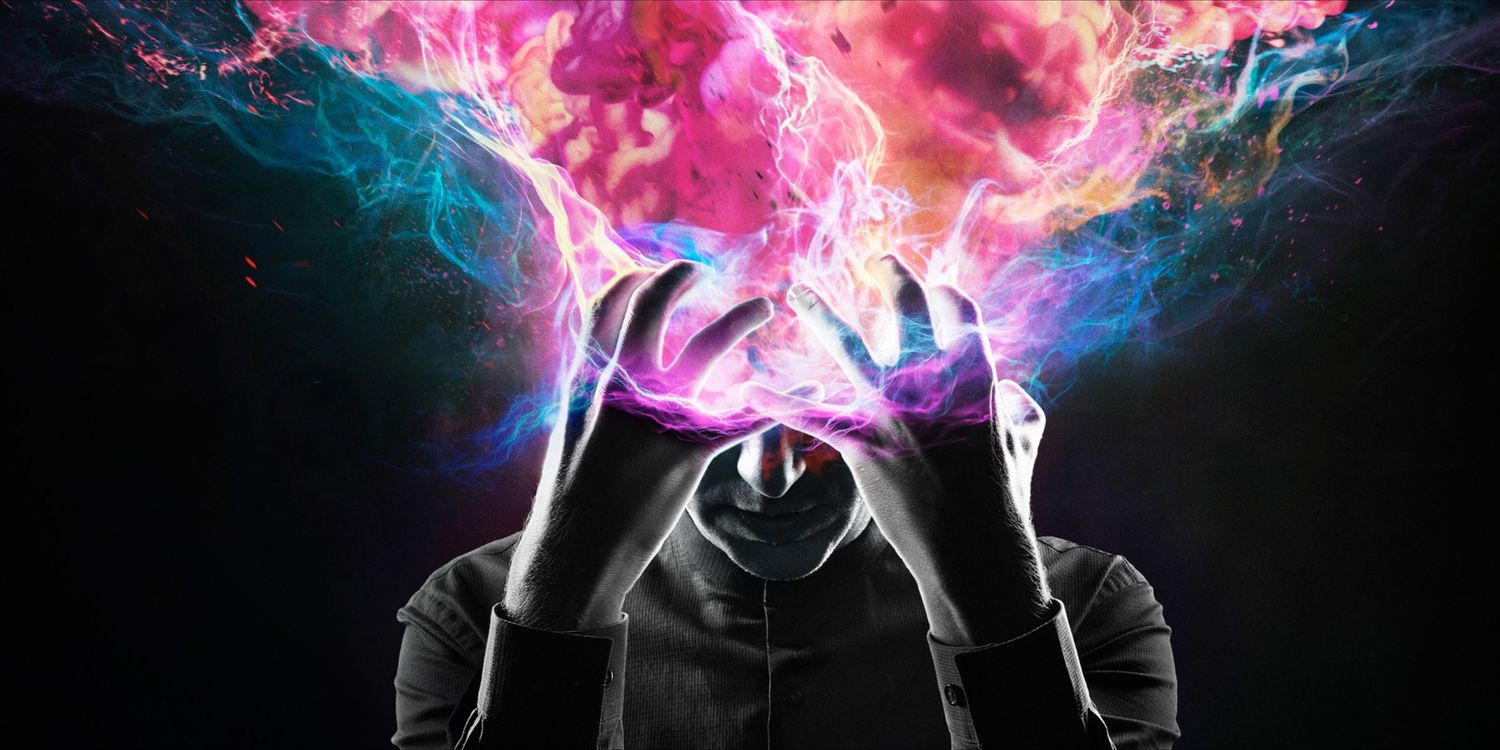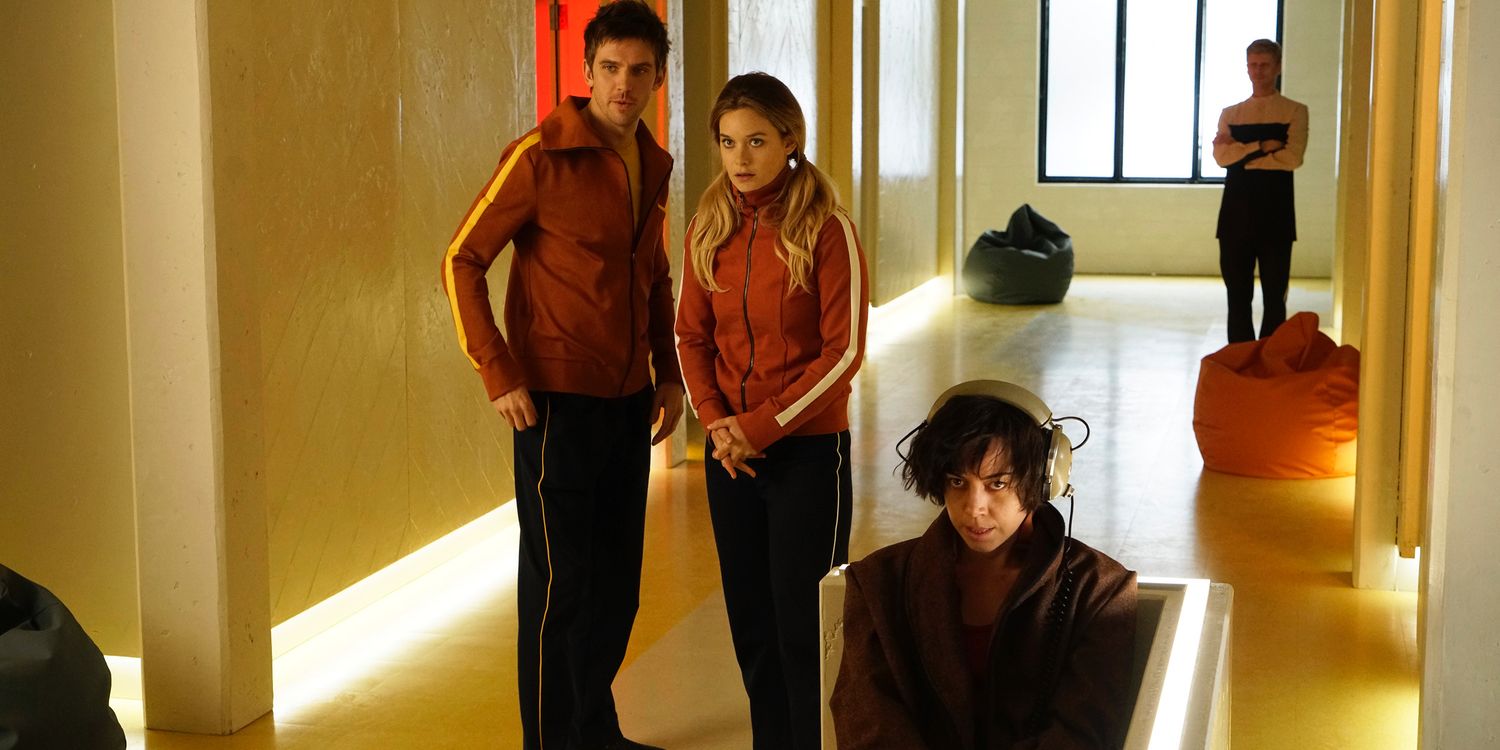Legion begins with an extended, dialogue-free opening sequence set to The Who's 'Happy Jack'. A hasty download of stylish micro-scenes revealing to the audience everything they need to know about the life and times of Dan Stevens' maybe-mutant David Haller, from his moments as a newborn to his idyllic suburban childhood to his troubled teens and young adult years. The montage is an expertly crafted character introduction, but as much as it has to say about the reality-questioning protagonist at the center (and boy, is he ever at the center), it has even more to say about the nature of the series itself and its creator, Noah Hawley. The decision to emphasize the creative forces behind Legion, and to do so with as much enthusiasm as a more typical comic book film or TV show would devote to its hero is the most telling example of the direction FX's new eye-poppingly original series is headed.
A visual feast throughout the super-sized premiere, Legion expresses itself with confidence through rhythms and aesthetics mostly unseen in the world of live-action superheroes. The show's look is a blend of Wes Anderson and Stanley Kubrick, but with the same playfulness Hawley brought to his other FX series, Fargo. Following the music cue-driven introduction, the premiere sets up shop in Clockworks Hospital, where David has been living as a diagnosed schizophrenic following a suicide attempt. This too is a tableau; one that thrusts Legion into an indistinct time and place, as visual cues like clothing, hairstyles, and the hospital's weirdly circular architecture and fixtures all come just shy of announcing the series as a period piece. Still, something feels off – a feeling that grows and becomes more unsettling as the premiere (and the series) continues to unfold.
The indistinctness of certain circumstances at first feels like a side effect of Hawley's direction – his second episode ever, along with the season 2 premiere of Fargo – which is marked by such precision in terms of the overall look of each shot, whether its is David and his buddy Lenny (Aubrey Plaza) watching a fellow patient drool in the common room, or David asking newcomer Syd (Rachel Keller) to be his girlfriend during group session that the lack of certain information feels like an oversight. But it's not. Instead, the almost overwhelming attention to detail and stylistic flourishes are of a piece with how Legion's narrative intends to travel through the looking glass of one specific perspective.
Almost obsessively intimate, the premiere goes to painstaking lengths to present the world as David experiences it, offering up a fractured timeline that cuts between a possible past and questionable present. Through it all, David seeks reassurance that what he's experiencing is real. The most effective use of David's uncertainty comes during a bombastic set piece, a long tracking shot in which Syd and her team stage a rescue, battling armed guards as everyone makes their way down a verdant slope to a beach where Jean Smart's mysterious Melanie Bird awaits. People are shot, soldiers are flung through the air, and powers are displayed so arbitrarily the fluid sequence begins to feel like a dream. At one point, David clutches Syd and asks her, "I have to know. Is this… is this real?" Despite Syd's assurances, the moment feels distinctly devoid of any.
The intimacy with David's point of view comes at a price; the audience is no more privy to the veracity of his circumstances than he is, leaving everything from explosive memories to the presence and intentions of the Devil with the Yellow Eyes unsettlingly ambiguous. This puts Legion on par with Mr. Robot, another television series praised for its highly stylized aesthetic and atomic-level consideration of its protagonist's unique and troubled perception of the world around him. But whereas Sam Esmail's twisty series makes its character's battle with mental illness a key part of the narrative, Hawley's is, for now, putting the question of David's schizophrenia into the premiere's ever-growing pile of unanswered questions.
The appeal of ambiguity is apparent, as the blurred lines between the series' unconfirmed truth and David's perspective allows the narrative to establish itself wherever and whenever, depending on the needs of the scene. Not long after David's sweet, arm's-length romance with Syd begins, the focus shifts to his interrogation by a government agent played by Hamish Linklater. The shift is abrupt, underlined by a drastic visual change. The characters' clothing is markedly different; eschewing the warm colors of the Clockworks patient outfits for a collarless monochromatic look, Legion shifts to a stark visual palate that nonetheless maintains a whimsical through-line thanks to the pastel-colored stocking caps worn by the government's henchmen.
But it also throws the timeline out of whack; Linklater's character carries with him a tablet that appears to be an anachronism, especially in contrast to the almost cartoonish EEG machine registering David's response to a series of uncomfortable questions pertaining to his inadvertent escape from Clockworks via a body swap with Syd. The swap allows the narrative to branch off again, putting David in the house of his sister Amy (Katie Aselton). The shift adds a layer of comedic tension fans of Fargo will find familiar, while also drawing attention to the impact of David's condition – the most powerful mutant or not – and the emotional baggage and uncertainty that's like a wall between the siblings.
Even when it's clear the walls of Clockworks were the source of Amy's peace of mind, the tone remains playfully peculiar. Such idiosyncrasies make for a wonderful respite from the necessity of interconnectivity and shared universes. Legion distinguishes itself through its immediate precision and novelty, and like Syd's inability to make skin-to-skin contact the distinction limits its ability to play with others. Viewers' mileage may vary on the series' aesthetic as well as its narrative ambiguities. That says nothing about Legion's tenuous connections to the X-Men franchise. At the end of the everything-but-the-kitchen-sink expansiveness of the premiere, it seems Hawley is asking viewers to take the same leap of faith David is. Things are ineveitably going to get smaller from here on out – no series can maintain such exuberant stylistic offerings while establishing a coherent narrative. But after seeing more of what Legion has to offer, it's a leap worth taking.
Next: Legion’s 15 Most WTF Personalities
Legion continues next Wednesday with 'Chapter 2' @10pm on FX.
Photos: FX Networks



